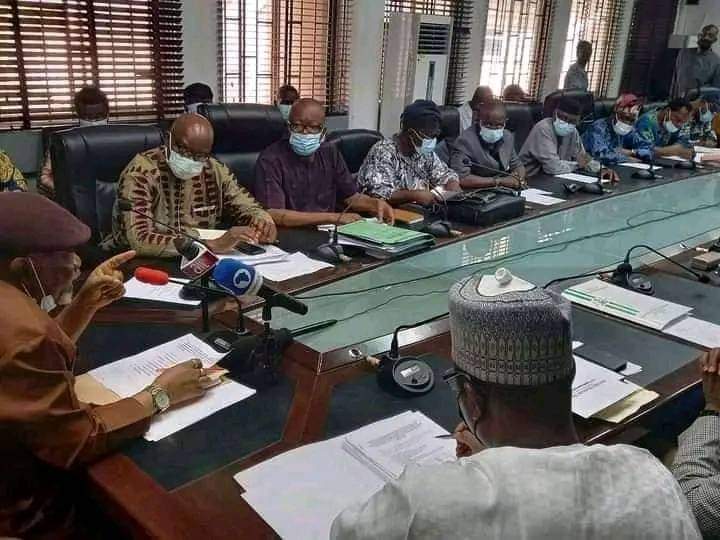ASUU’s Determination: The Ongoing Strike for Educational Reform
Understanding Funding for Universities

ASUU’s Determination: The Ongoing Strike for Educational Reform
Introduction
The Academic Staff Union of Universities (ASUU) has long been at the forefront of advocating for improvements in the Nigerian education system. In recent developments, the union has once again embarked on a strike to address critical issues within the country’s higher education sector. In this blog post, we will explore ASUU’s stance, the issues they aim to address, and the implications of this ongoing strike for the future of education in Nigeria.

ASUU’s Key Concerns
- Funding for Universities: One of ASUU’s primary concerns is the inadequate funding of Nigerian universities. The union believes that this underfunding affects the quality of education, infrastructure, and research capabilities.
- Salary Arrears: ASUU has called for the payment of outstanding salaries and allowances owed to university staff, stressing that this issue has gone unaddressed for too long.
- Inadequate Infrastructure: Decaying infrastructure, including classrooms, laboratories, and libraries, is another major concern. ASUU argues that these conditions hinder effective teaching and learning.
- Revitalization of Universities: The union is pushing for the revitalization of Nigerian universities through financial investment, faculty recruitment, and infrastructure development.
- Re-Negotiation of the 2009 Agreement: ASUU is calling for a re-negotiation of the 2009 agreement between the government and the union, emphasizing that many of the agreement’s provisions have not been fully implemented.
The Ongoing Strike
ASUU’s decision to embark on strikes is not taken lightly. It reflects the frustration and determination of university staff to bring about much-needed reform. The current strike, which began in August 2021, has caused significant disruptions to the academic calendar, affecting students and the entire educational ecosystem.
Implications and the Way Forward
The ongoing strike has far-reaching implications:
- Academic Disruption: Students face disruptions in their academic schedules, potentially leading to delayed graduations and extended study periods.
- Economic Impact: The strike affects the livelihoods of university staff who rely on their salaries.
- Global Competitiveness: Nigeria’s universities risk falling behind globally in terms of research, innovation, and academic excellence.
- Brain Drain: The lack of funding and job satisfaction may lead to a “brain drain” as qualified academics seek opportunities abroad.
To move forward, it is crucial for both the government and ASUU to engage in constructive dialogue. This means addressing the legitimate concerns of university staff and working to revitalize the higher education sector. A well-funded, well-equipped, and motivated university system is not only an investment in education but also in the nation’s future.

The Lifeline of Higher Education: Understanding Funding for Universities
Universities are the crucibles of knowledge, innovation, and progress. They play a pivotal role in shaping society, fostering research, and developing the leaders of tomorrow. However, the pursuit of academic excellence and the provision of quality education require substantial financial support. In this blog post, we will explore the critical role of funding for universities, the challenges they face, and the implications of financial support on higher education.
The Importance of University Funding
- Academic Excellence: Adequate funding is a cornerstone of academic excellence. It allows universities to attract and retain top faculty, offer cutting-edge research opportunities, and maintain state-of-the-art facilities.
- Research and Innovation: Universities are hotbeds of research and innovation. Funding supports research initiatives, encourages breakthrough discoveries, and drives technological advancements.
- Student Support: Funding enables universities to provide scholarships, financial aid, and other forms of support to students, making education accessible to a diverse population.
- Infrastructure Development: From classrooms and laboratories to libraries and recreational spaces, funding ensures the creation and maintenance of the physical infrastructure necessary for learning.
- Global Competitiveness: Well-funded universities are more competitive on the global stage, attracting international students and collaborations, which, in turn, contribute to the nation’s reputation and economy.
Challenges in University Funding
- Government Budget Constraints: Many public universities depend on government funding, which can be limited due to budget constraints, competing priorities, or economic challenges.
- Inconsistent Policies: Frequent changes in government policies and budget allocations can disrupt long-term planning and hinder effective financial management.
- Private Universities: Private universities often rely on tuition fees and philanthropy, but ensuring sustainable funding can be a challenge, particularly for newer institutions.
- Funding Gaps: The rising costs of education, faculty salaries, and infrastructure development can lead to funding gaps that hinder universities’ ability to deliver quality education.
Implications of Inadequate Funding
- Academic Compromises: Insufficient funding can result in overcrowded classrooms, outdated resources, and overworked faculty, which ultimately compromise the quality of education.
- Research Stagnation: Without proper funding, research initiatives may falter, and universities could miss out on groundbreaking discoveries and innovations.
- Reduced Access: High tuition fees and a lack of financial aid may limit access to higher education, preventing talented individuals from pursuing their academic dreams.
- Global Competitiveness: Universities that lack funding may struggle to attract international students, diminishing their global competitiveness.
The Way Forward
- Government Commitment: Governments should prioritize higher education funding, recognizing the role universities play in national development and global competitiveness.
- Diversification of Revenue Streams: Universities can explore diverse income sources, including research grants, partnerships with industries, and philanthropic support.
- Efficient Financial Management: Efficient financial planning and management are critical to maximizing the impact of available resources.
- Advocacy and Public Awareness: Awareness campaigns can help the public and policymakers understand the importance of adequate funding for universities.

Unpaid Dues: The Impact of Salary Arrears on Workers and the Economy
Salary arrears, or delayed payment of wages, is a pressing issue that affects countless workers worldwide. It has wide-ranging implications not only for individual employees but also for the broader economy. In this blog post, we will delve into the significance of salary arrears, the reasons behind this problem, and its profound impact on workers and economies.
The Importance of Timely Salary Payments
- Economic Stability: Timely payment of salaries is crucial for economic stability, as it enables workers to meet their basic needs and contribute to the local economy through spending.
- Worker Motivation: Employees who receive their salaries on time tend to be more motivated and productive, which is essential for the success of any organization.
- Morale and Well-Being: Unpaid wages can lead to stress, anxiety, and reduced job satisfaction, impacting the mental and emotional well-being of workers.
- Social Impact: Delayed salary payments can affect families and communities, potentially leading to social issues if left unaddressed.
Reasons Behind Salary Arrears
- Financial Challenges: Employers may face financial difficulties, including cash flow problems or debts, which hinder their ability to pay wages promptly.
- Mismanagement: Poor financial management, including improper budgeting and expenditure, can result in delayed salary payments.
- Economic Downturn: Economic crises or recessions can lead to reduced revenues and, subsequently, delayed wages.
- Lack of Oversight: In some cases, a lack of regulatory oversight or enforcement of labor laws may allow employers to evade their salary payment obligations.
Impact on Workers
- Financial Hardship: Employees may struggle to meet their daily expenses, leading to financial hardships, debt, and even poverty.
- Emotional Stress: The anxiety and uncertainty caused by unpaid wages can take a toll on the mental health and well-being of workers.
- Reduced Productivity: Employee morale and productivity may decline as a result of financial stress and dissatisfaction.
- Long-Term Consequences: Delayed salary payments can have long-term effects, affecting workers’ savings, investments, and retirement plans.
Impact on the Economy
- Consumer Spending: When workers do not receive their wages promptly, consumer spending decreases, which can negatively impact businesses and the broader economy.
- Unemployment: Salary arrears may lead to job losses if companies are unable to maintain their workforce, further contributing to unemployment rates.
- Social Unrest: In extreme cases, widespread salary arrears can lead to social unrest, strikes, and protests, affecting economic and political stability.
- Reduced Tax Revenue: A reduction in consumer spending and business activities can lead to decreased tax revenue for the government.
Addressing Salary Arrears
- Strict Labor Laws: Governments can enact and enforce labor laws that require timely payment of salaries and impose penalties for non-compliance.
- Financial Education: Educating workers on financial planning and savings can help them better manage their finances during salary delays.
- Conflict Resolution: Employers and employees can engage in open communication and mediation to address wage-related disputes.
- Emergency Funds: Establishing emergency funds or social safety nets can provide temporary relief for workers facing salary arrears.

The Backbone of Progress: Understanding the Impact of Inadequate Infrastructure
Infrastructure forms the foundation upon which societies and economies are built. It encompasses a wide range of systems, facilities, and structures that enable essential services and economic activities. However, inadequate infrastructure can have far-reaching implications, affecting not only daily life but also a country’s development. In this blog post, we will explore the importance of infrastructure, the consequences of inadequate infrastructure, and the steps needed to address this critical issue.
The Significance of Infrastructure
- Economic Growth: Robust infrastructure, including transportation, energy, and communication networks, is essential for economic growth and competitiveness.
- Quality of Life: Infrastructure directly impacts the quality of life, with access to clean water, sanitation, healthcare, and education being vital services.
- Social Inclusion: Adequate infrastructure ensures that all segments of society have equal access to essential services and opportunities.
- Disaster Resilience: Well-planned infrastructure can enhance a community’s resilience to natural disasters and other emergencies.
- Urban Development: Infrastructure plays a key role in shaping urban areas, influencing factors like accessibility, traffic management, and land use.
Consequences of Inadequate Infrastructure
- Economic Inefficiency: Inadequate transportation and energy infrastructure can lead to inefficiencies, increased costs, and reduced economic productivity.
- Health and Education Challenges: A lack of proper healthcare and educational infrastructure can hinder access to essential services and quality education.
- Social Inequities: Insufficient infrastructure can exacerbate social inequalities, as vulnerable communities often lack access to basic services.
- Environmental Impact: Inadequate infrastructure can lead to environmental degradation, including pollution and deforestation.
- Public Safety Risks: Poorly maintained infrastructure, such as crumbling bridges or outdated utilities, can pose risks to public safety.

Addressing Inadequate Infrastructure
- Investment: Governments must allocate resources for infrastructure development and maintenance, working to bridge gaps and expand services.
- Public-Private Partnerships: Collaboration between the public and private sectors can help fund and manage infrastructure projects.
- Innovation: Embracing new technologies and sustainable practices can lead to more efficient and environmentally friendly infrastructure solutions.
- Planning and Governance: Effective planning and transparent governance are critical for successful infrastructure development.
- Community Involvement: Engaging with local communities in the planning and decision-making process is vital for ensuring that infrastructure meets their needs.
Conclusion
The ongoing ASUU strike reflects the urgent need for comprehensive reform in Nigeria’s higher education sector. While the strike may cause temporary disruptions, the long-term goal is to create a stronger, more globally competitive university system. It is imperative that both the government and ASUU continue to engage in dialogue and find common ground to ensure the right steps are taken to address the issues at hand and provide a brighter future for Nigeria’s students and universities.







